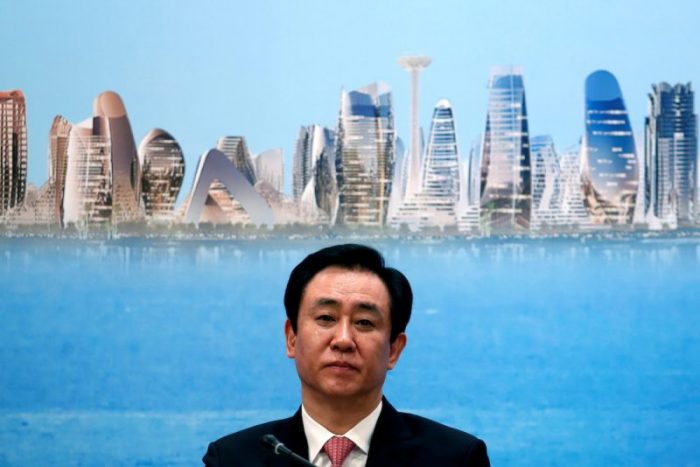China Evergrande Group confirmed late on Thursday that its chairman and founder Hui Ka Yan had been apprehended due to suspicion he had committed criminal offences.
In a regulatory filing to the Hong Kong Stock Exchange, the company said it had received notification from relevant authorities that Hui “has been subject to mandatory measures due to suspicion of illegal crimes” (sic).
No details were revealed on what the measures were or what crimes he or company employees were suspected of having committed, the local financial news-site Caixin Global reported.
Trading in Evergrande Group shares was suspended on Thursday after a report that Hui had been placed under police watch, as concerns mounted about the cash-strapped developer’s future amid growing threat of liquidation.
ALSO SEE: China Vows Anti-Corruption Crackdown on Financial Sector
Company’s luxury yacht sold for $32m
News has also emerged that the embattled company sold its luxury superyacht for about $32 million earlier this year, further shrinking the firm’s offshore assets as its cash crunch worsened.
Evergrande’s offshore bondholders are expected to sharpen their focus on offshore assets as the developer’s debt revamp plan flounders while official inquiries continue.
Evergrande sold the 60-metre superyacht Event for 30 million euros ($32 million) as part of a process to sell down non-core assets, three sources told Reuters. They declined to be named as the information is not public yet.
‘Event’ was registered in Evergrande’s name, the sources said, which meant the proceeds will be returned to the developer, which has seen some of its own and the founder’s offshore assets divested or seized by lenders for defaulting on loans.
A Boeing private jet of Evergrande was sold in July last year for $100 million, the sources said. That follows reports that the group sold two Gulfstream jets, allegedly for more than $50 million.
Lenders to Evergrande’s Hong Kong headquarters appointed a receiver in September last year to seize the building and tender it for sale. The property was valued at HK$8-9 billion ($1-1.15 billion) at that time.
Of the remaining offshore assets of the company and its founder, creditors will need to establish whether they have already been used as collateral to raise funds.
‘No developer is too big to fail in China’
Meanwhile, with chairman Hui Ka Yan under investigation, analysts and investors are questioning who will run the company’s operations and what will happen to the offshore debt restructuring plan.
After defaulting on its dollar bond in late 2021, Evergrande has been in the process of seeking creditors’ approval for its proposals to restructure offshore debt worth $31.7 billion, which includes bonds, collateral, and repurchase obligations.
With more than $300 billion in liabilities – roughly the size of Finland’s gross domestic product – Evergrande has become the poster child of the debt crisis in China’s property debt sector, which contributes to roughly a quarter of the economy.
Evergrande has been working to get creditors’ approval for restructuring its offshore debt. The process got complicated this week after Evergrande said it was unable to issue new debt due to an investigation into its main China unit.
The offshore debt restructuring plan now looks set to falter and the risks of the company being liquidated are rising, some analysts said.
On Tuesday a major Evergrande offshore creditor group said it was planning to join a liquidation court petition filed against the developer if it does not submit a new debt revamp plan by the end of October.
“It is unclear why Hui is under police surveillance, but it may signal certain negotiations demanded from the government. The latest development has disrupted the hope of restructuring,” Gary Ng, Asia Pacific senior economist at Natixis, said.
“No developer is too big to fail in China, and therefore it is hard to imagine a full bail-out. Still, when it comes to stability, it is possible to see more government influence in different ways,” Ng said.
The company shares ended down 19% on Wednesday in the Hong Kong market, taking their losses to 81% since the resumption of trading in late August after a 17-month suspension.
Mortgage rates cut but sector woes may be prolonged
Evergrande’s latest woes come against the backdrop of Beijing rolling out a raft of measures in the last few weeks, including cutting of existing mortgage rates, to revive the battered property sector.
The recent regulatory easing may stabilize the housing market in the world’s second-largest economy to some extent, Saxo Greater China Market Strategist Redmond Wong wrote in a research note.
“Still, the overhang of housing inventories in lower-tier cities facing population decline will persist for several years,” he said.
“This will lead to more headlines about defaults, restructuring, and liquidation of insolvent developers, causing losses for shareholders, bondholders, banks, and investors in trust and wealth management products tied to property projects.”
- Reuters with additional reporting and editing by Jim Pollard
ALSO SEE:
Hui Ka Yan and The Rise and Fall of China Evergrande
China Evergrande Sinks 80% as Trading Resumes After 17 Months
Country Garden Voices ‘Deep Remorse’ for $6.7bn First Half Loss
China Evergrande Files Claim in US Court to Protect Its Assets
China Evergrande EV Unit Posts $10 Billion Two-Year Loss
























